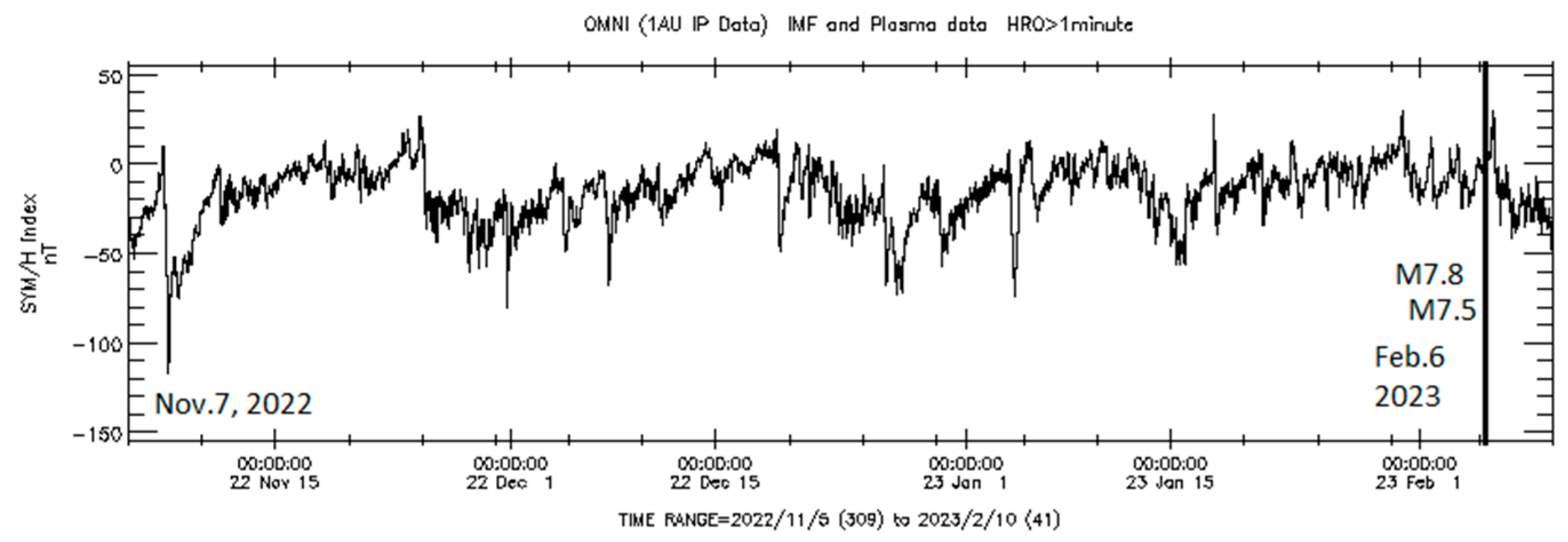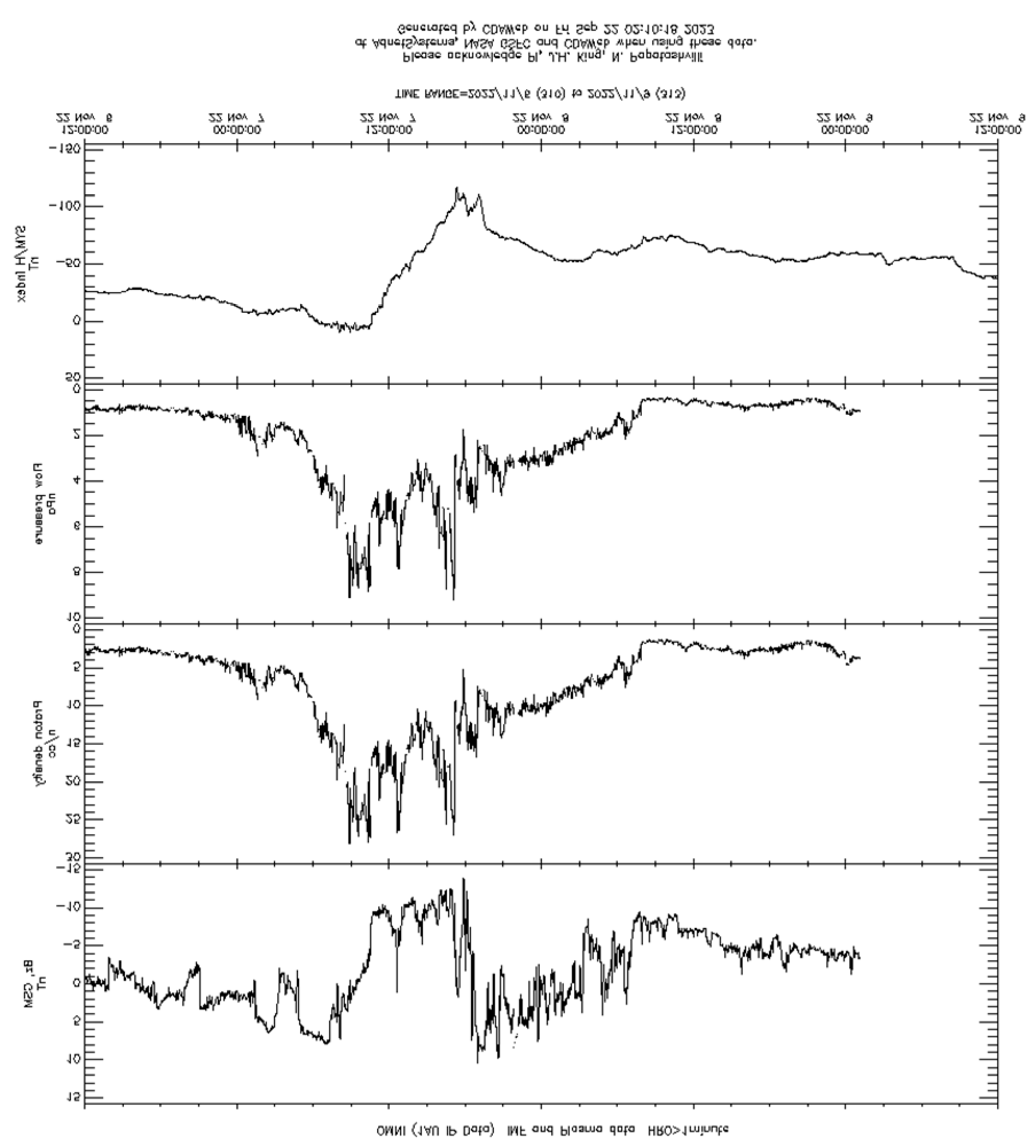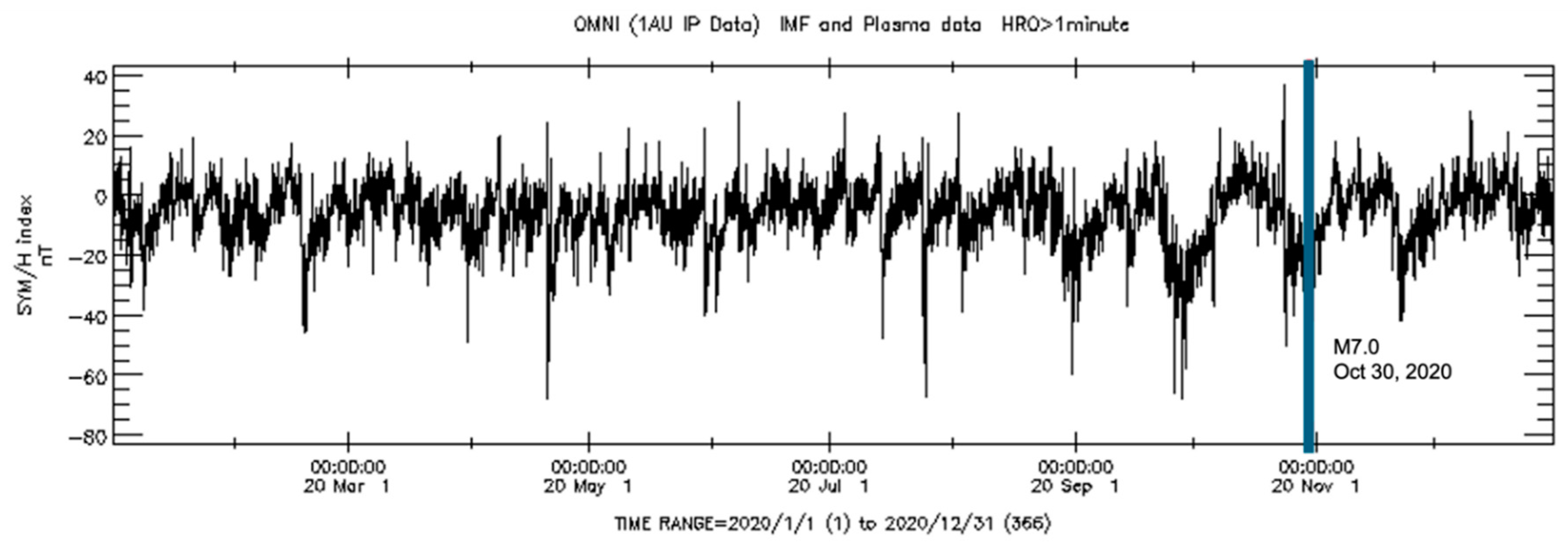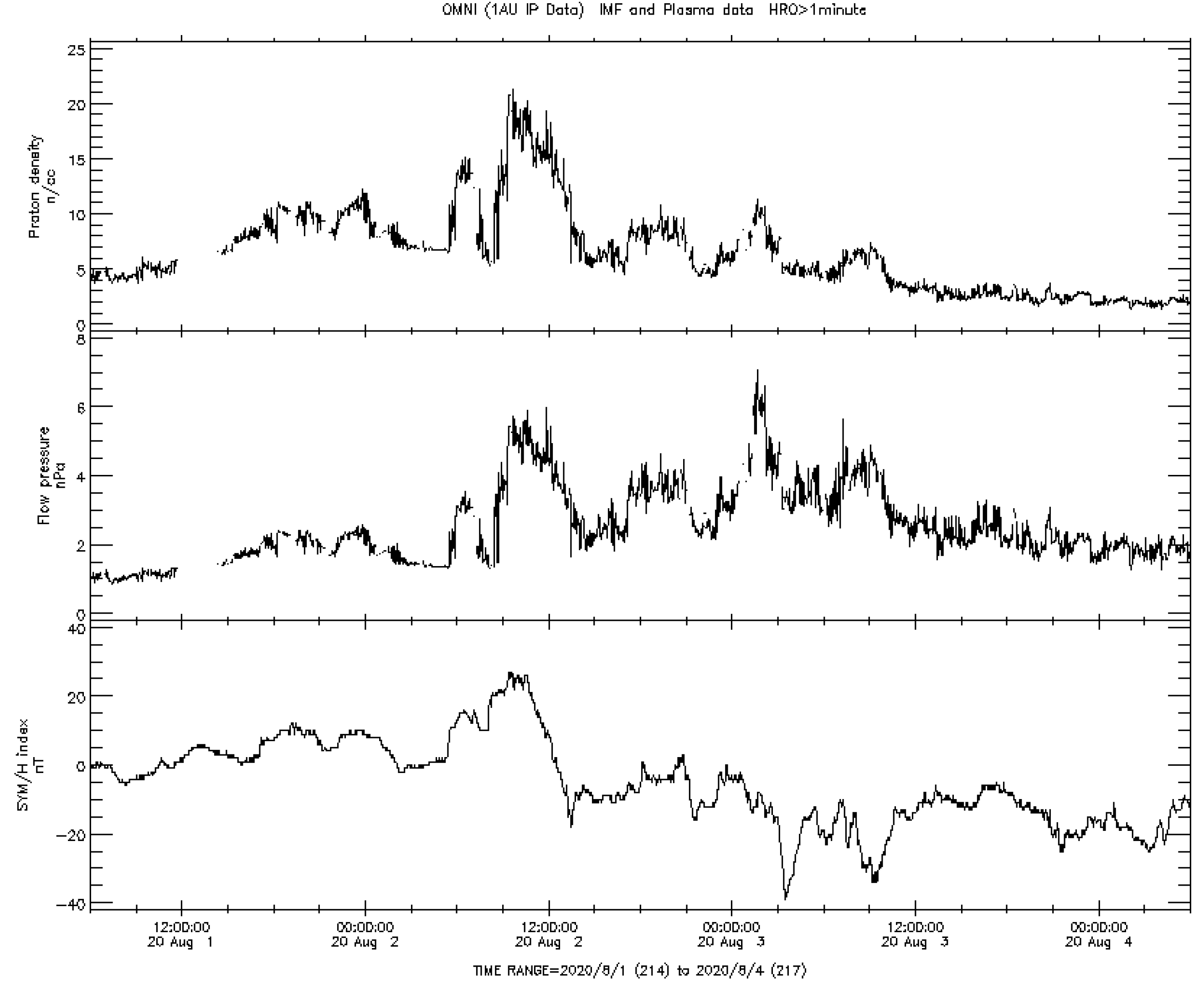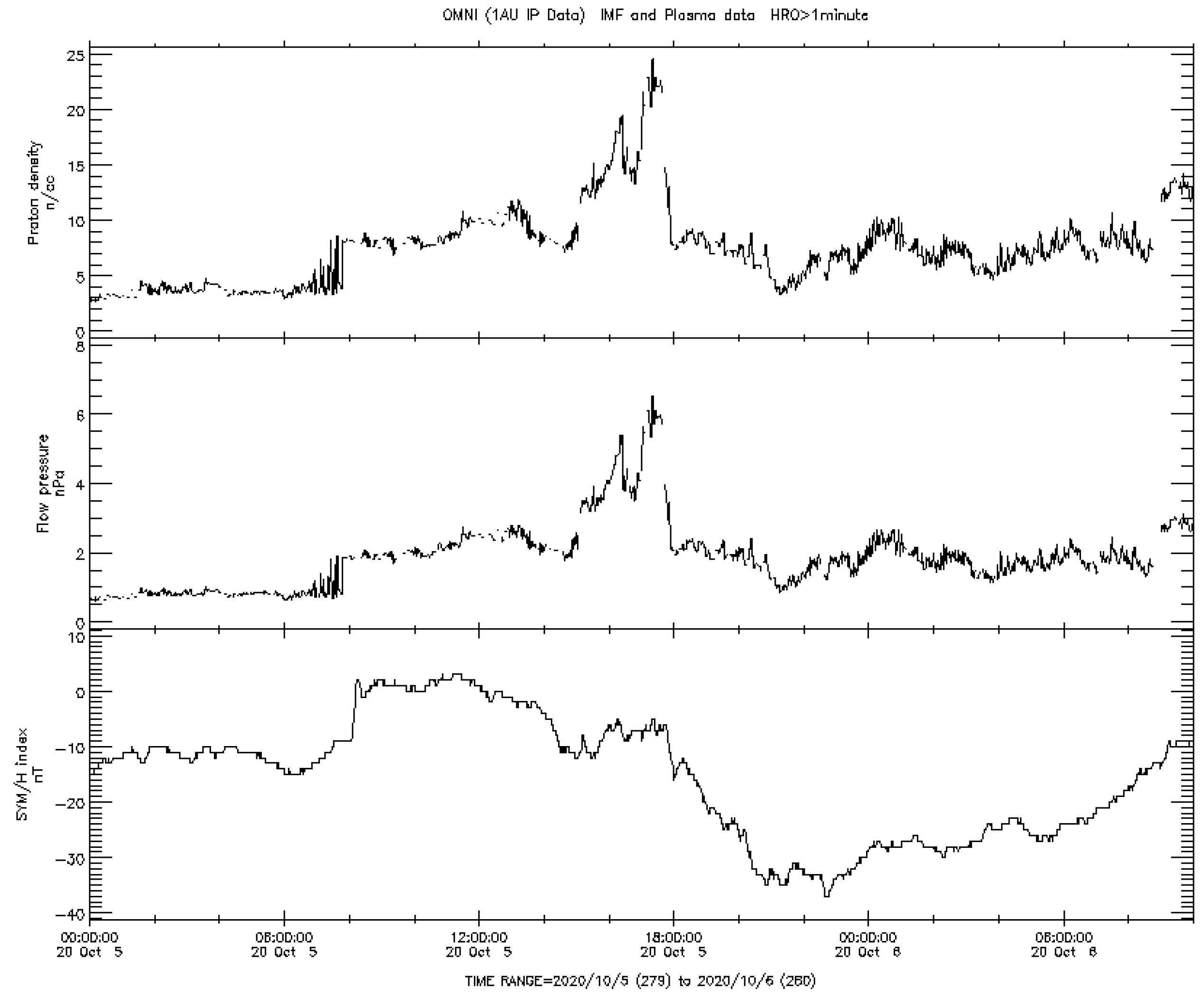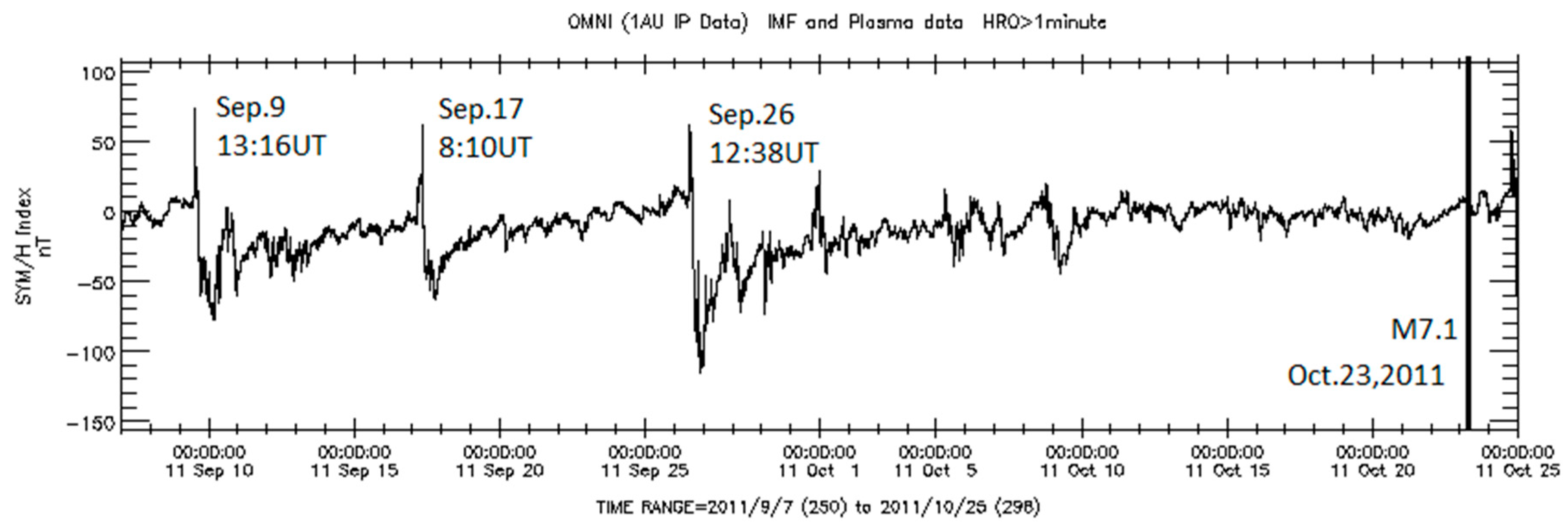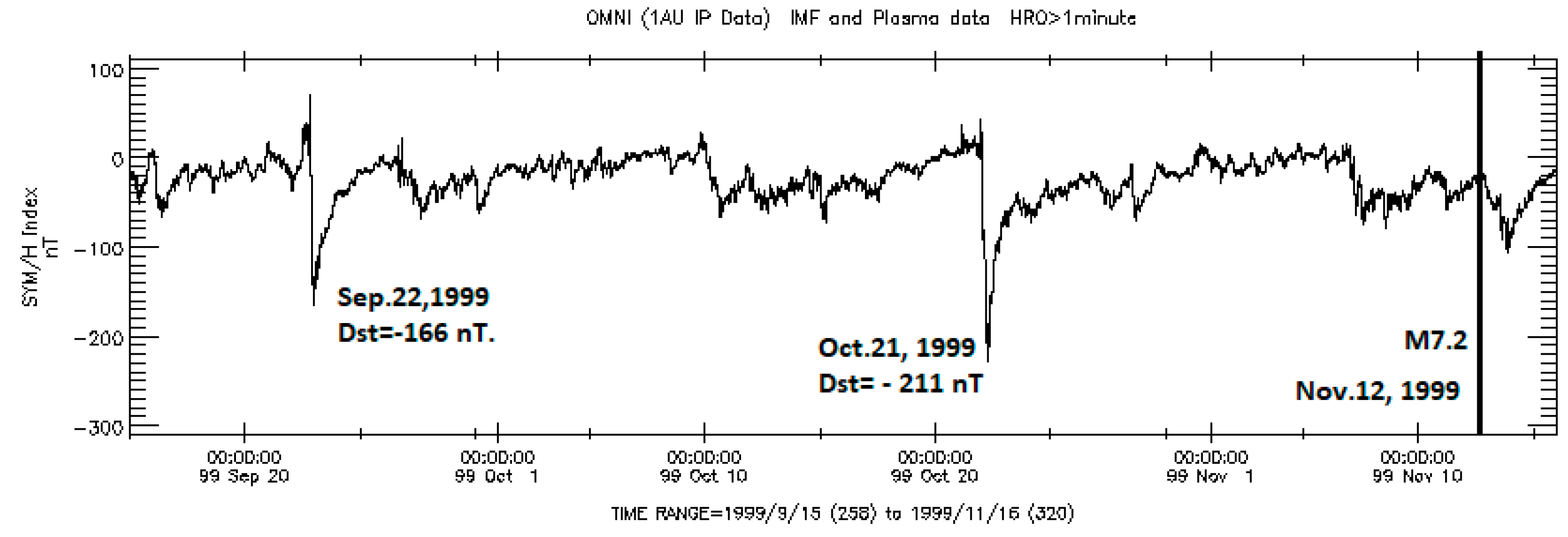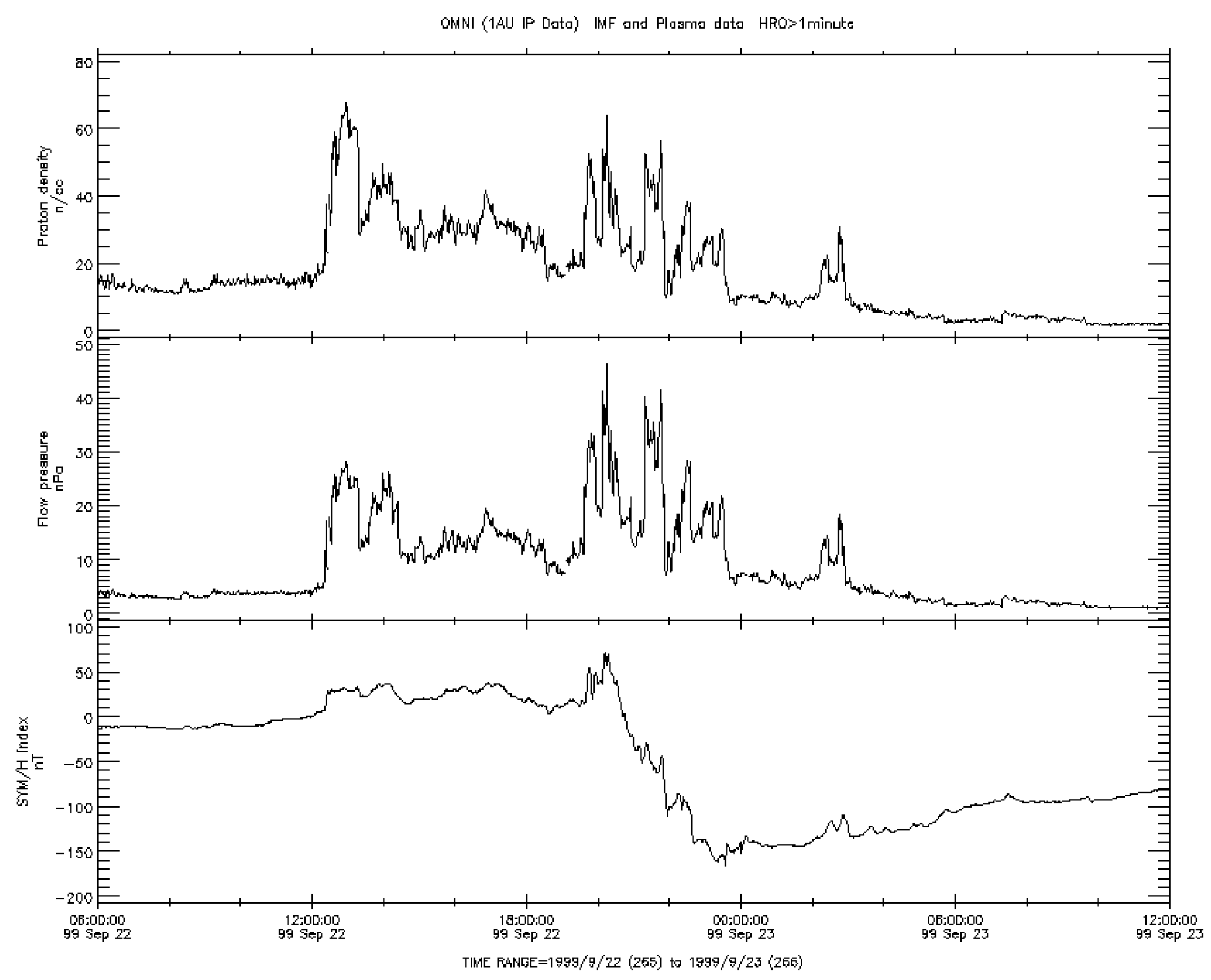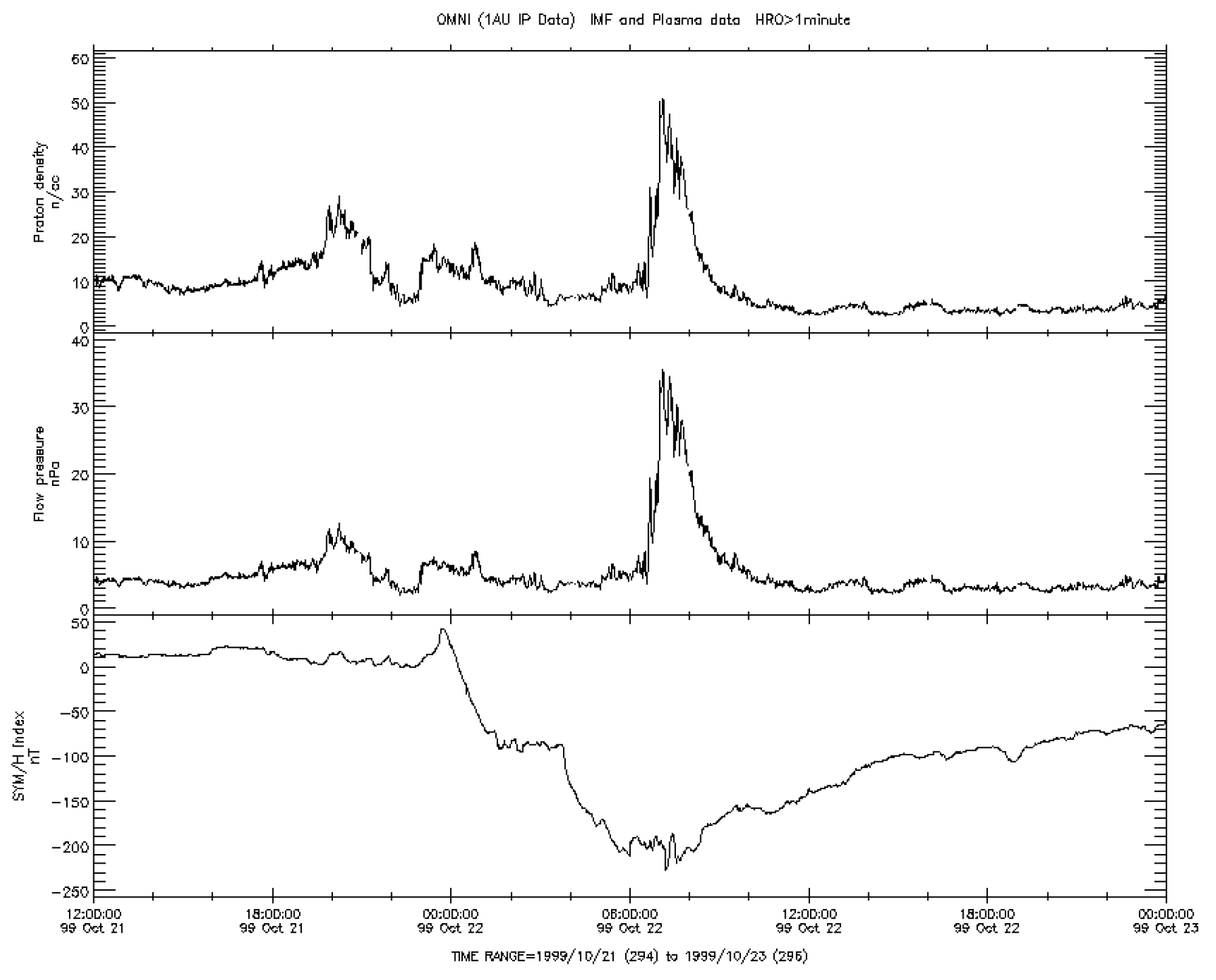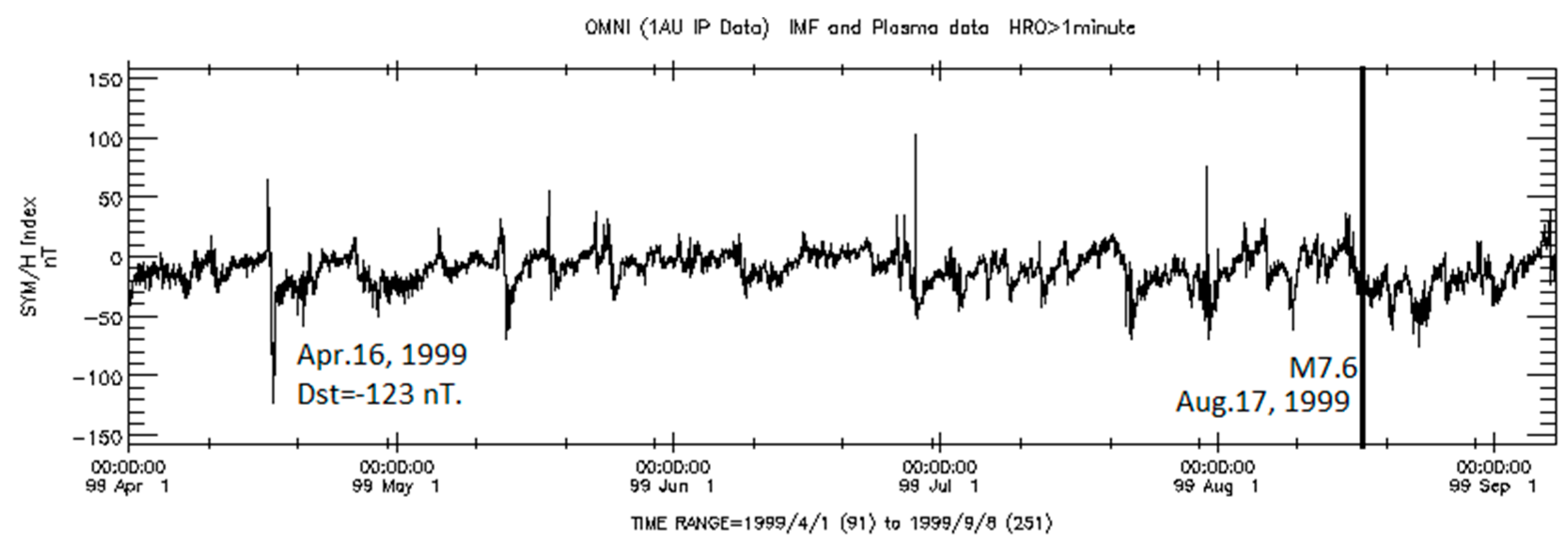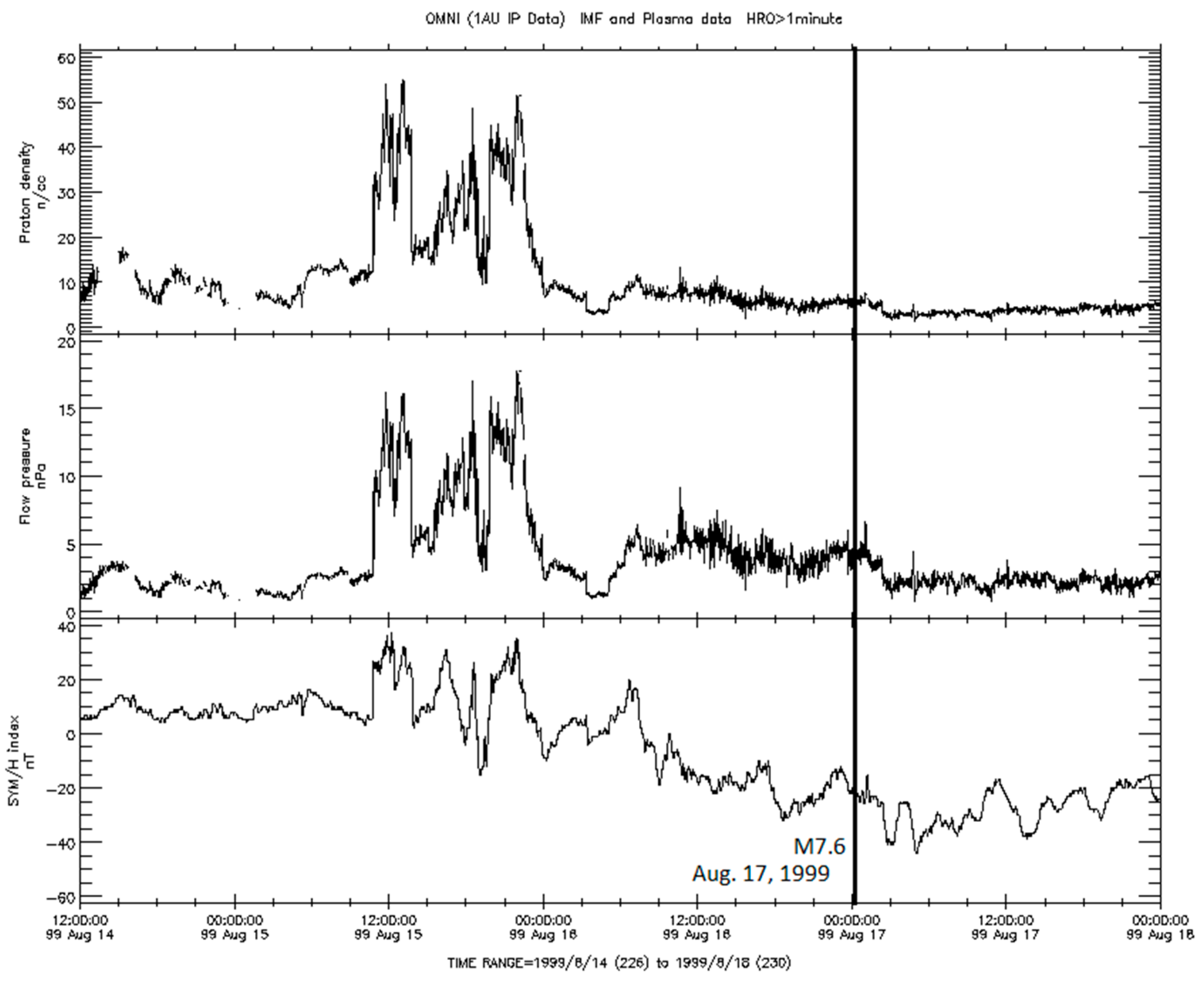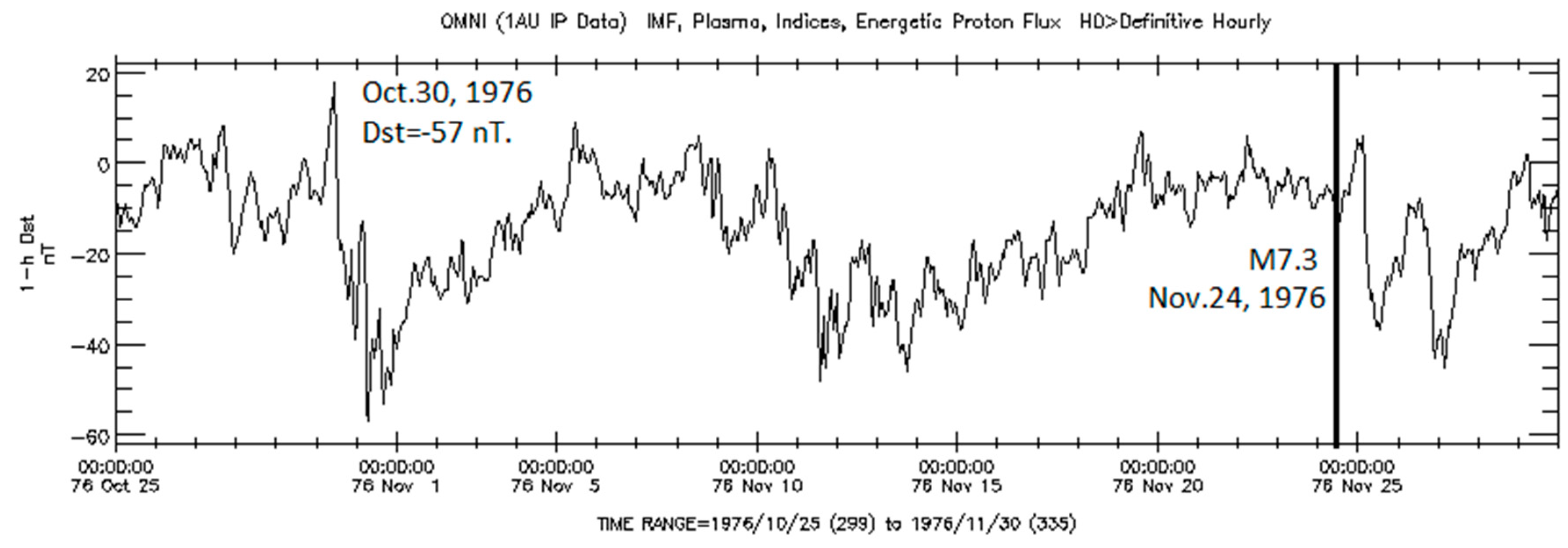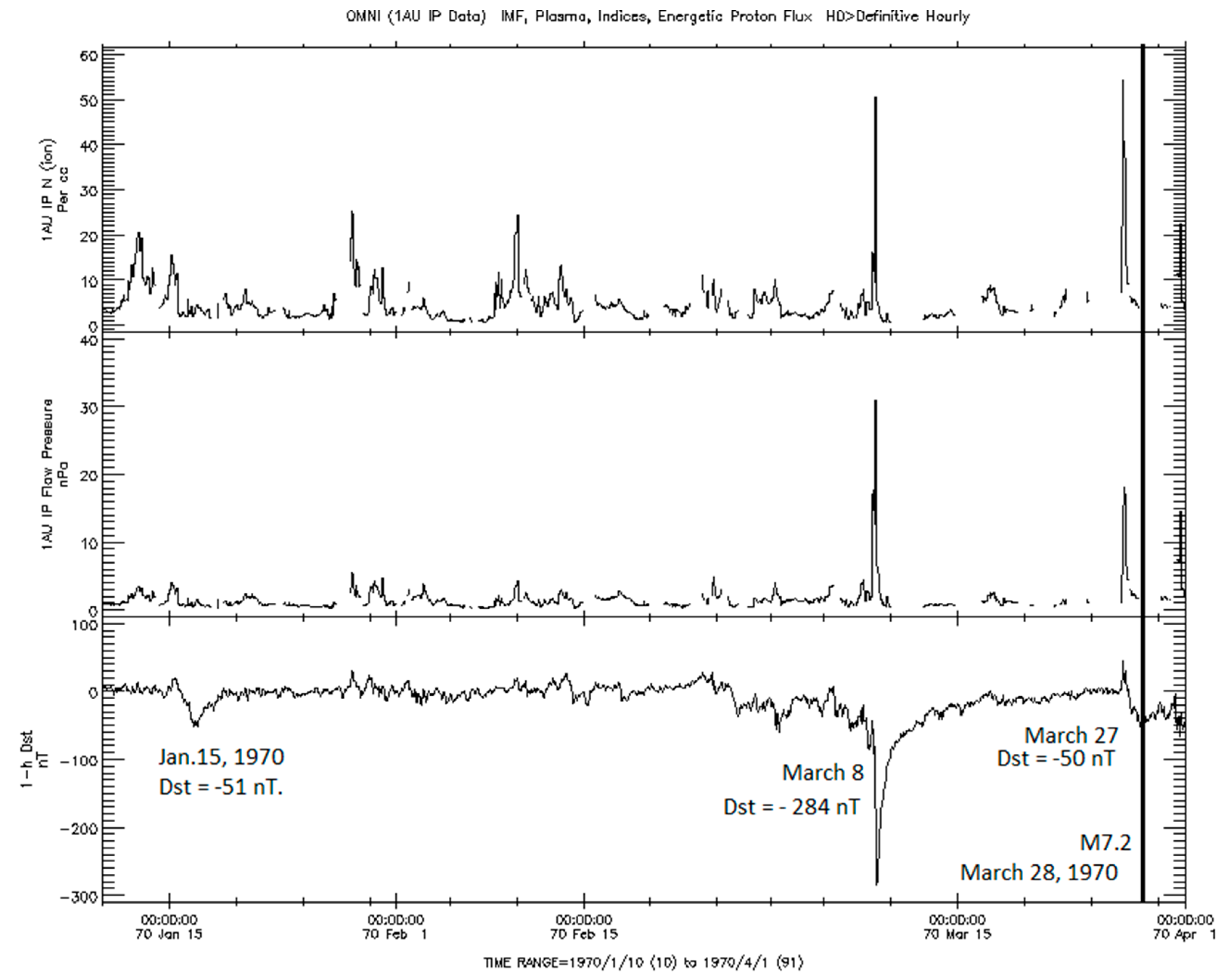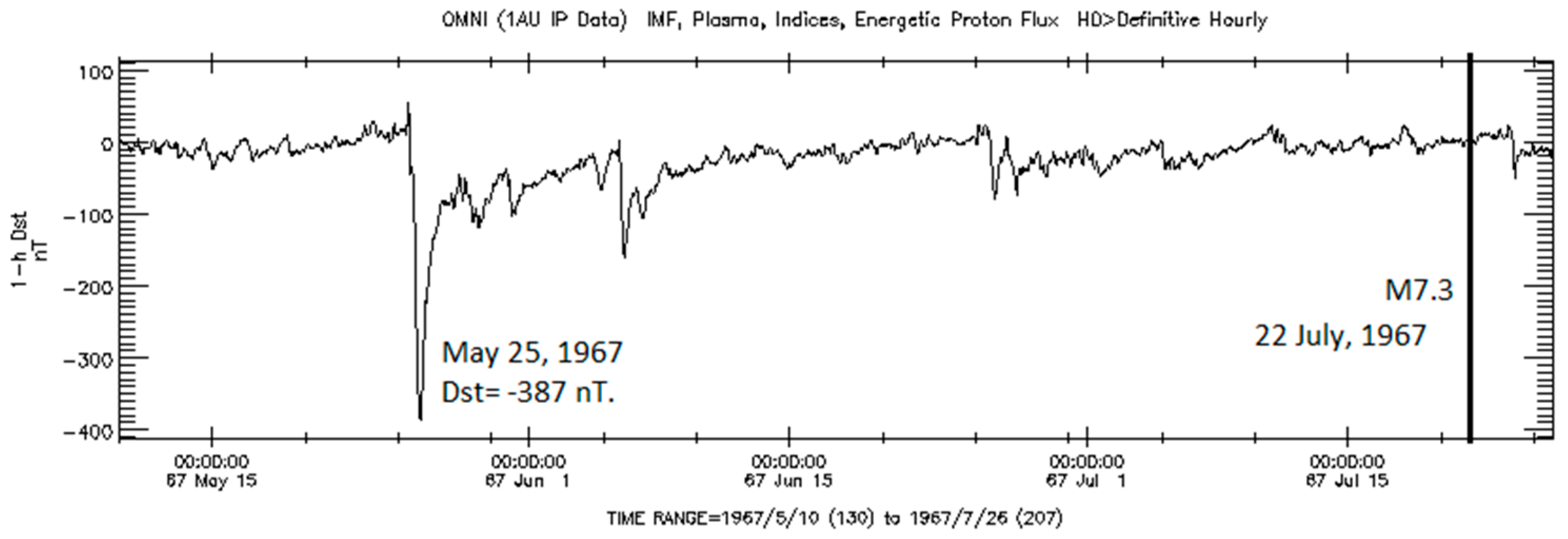1. Introduction
It is found in some papers, for example ([
1,
2,
3,
4,
5], and references herein), that earthquake occurrence may be preceded by a geomagnetic storm, which is one of Earth's most striking manifestations of solar wind activity. A lag time between a magnetic storm onset and an earthquake occurrence varies; it could be about 2 - 6 days [
1], 12-14 days [
2], 26–27 days [
3], some months [
5], and for very large earthquakes (M7.5+) it may reach up to some years [
4]. Nevertheless, the idea of a relationship between earthquake occurrence and a magnetic storm is considered up to now controversial [
6]. For example, it was studied in [
7] the ratio of earthquakes that happened on geomagnetically disturbed days (Dst≤ - 30 nT) to those that occurred on geomagnetically quiet days using data on 122 838 events with magnitudes from 3.0 to 7.9 that occurred from 1965 to 2005 in the Anatolian peninsula. It was concluded: “As a result of all these data, a hypothesis cannot be put forward which suggests that geomagnetic storms trigger earthquakes in the Anatolian peninsula. However, these results should not hinder the conduct of further research. A global study on this subject can potentially provide new approaches”. Our paper presents the results, which were obtained with a new, to some extent, approach. So, it was revealed in [
5] that strong earthquakes prefer to occur at those longitudes after geomagnetic storms. Their high-latitudinal part was located under the polar cusp during storm onset (storm sudden commencement - SSC). From a magnetic field point of view, the polar cusp is a funnel-shaped region where the high-latitude dayside (compressed) and night side (elongated) magnetic field lines converge toward the geomagnetic poles [
8]. Under the polar cusp, the solar wind plasma would directly access the Earth's environment. According to [
9], most of the time, the polar cusp is between 10h and 14h of the Magnetic Local Time (MLT), but depending on solar wind and magnetosphere conditions, it may be between 08–16h [
10]. In a present paper, we applied an approach [
5] to investigate a possible relationship between the two catastrophic M7.8 and M7.5 Kahramanmaras earthquake sequence on February 6, 2023, with a preceded geomagnetic storm, which satisfied a condition: at the time of storm onset, the MLT in the area of the future epicenters should have been within 10h-14h [
9] or 08h-16h [
10]. To verify an approach once more, we analyzed, in the same way, all strong earthquakes (M≥7.0) that occurred here since 1967. The obtained results support our suggestion.
2. Materials and Methods
This study investigates earthquakes from the United States Geological Survey (USGS) global seismological catalog(
https://earthquake.usgs.gov/earthquakes/search/). The data on the solar wind parameters are taken from the OMNI database (
http://cdaweb.gsfc.nasa.gov), which was obtained from current and past space missions and projects. From the World Data Center for Geomagnetism, Kyoto (
https://wdc.kugi.kyoto-u.ac.jp/), the onset and intensity of the geomagnetic storms were revealed using the 1-hour Dst (Disturbance Storm Time Index) before 1981, while the 1-min SYM-H index after 1981, since the last one is absent before 1981. The SYM-H index is, in fact, the high-resolution Dst index [
11], allowing one to determine the onset and intensity of a magnetic storm correctly. According to [
12], depending on the Dst value, geomagnetic storms are classified into weak (Dst from −30 to −50 nT), moderate (Dst from −50 to −100 nT), strong (Dst from −100 to −200 nT), powerful (Dst from −200 to −350 nT) and extreme (Dst below −350 nT). Also, we used data on the storm sudden commencement - SSC, which were obtained by the Observatorio del Ebro, Roquetes, Spain, from the web page (ftp://ftp.ngdc.noaa.gov/STP/SOLARDATA/sudden commencements/storm2.SSC). Since we have revealed [
5] that the occurrence of strong earthquake may follow a particular magnetic storm in only a specific longitudinal region (depending on the time of geomagnetic storm onset), and since the time delay between storm onset and earthquake occurrence may enormously vary, at this step, a method of investigation was a manual. For each selected earthquake, the closest preceding geomagnetic storm was identified, which satisfied the condition: at the time of storm onset, the Magnetic Local Time (MLT) around the future epicenter should have been within 08h-16h. The MLT values were estimated using the online program (
https://omniweb.gsfc.nasa.gov/vitmo/cgm.html).
4. Discussion
One of the still open questions to the Earth and space community is how the energy of the geospace environment impacts the lithospheric processes. Some papers show that the solar flare X-ray radiation, coronal mass ejections, and geomagnetic storms may precede the occurrence of earthquakes ([
1,
2,
3,
4,
5,
13,
14,
15,
16,
17], and references herein). Many years of statistical searching in this direction led to a mathematical model [
18] that considers a hypothesis of electromagnetic earthquakes being triggered by a sharp rise of telluric currents in the lithosphere, including crust faults, due to the interaction of solar flare X-ray radiation with the ionosphere–atmosphere–lithosphere system.
A critical point in the model [
18] is the increase in the ionosphere's radiation and conductivity. Besides this, it is believed that global seismic activity tends to increase in a solar minimum (e.g., [
14,
15,
16,
17], and references herein). Again,
a critical point in this effect may be an increase in radiation and conductivity of the upper troposphere and lower stratosphere, produced by the galactic cosmic rays [
19,
20], whose intensity increases in solar minimums. It has been found recently [
17] that strong earthquakes may look as addressed (targeted) because they occur near the footprints of certain geomagnetic lines belonging to a newly created radiation belt into the lower magnetosphere when the high-energy electrons in the outer radiation belt spill down due to geomagnetic storm. Again,
a critical point for this effect may be an increase in radiation and conductivity in the mesosphere and upper stratosphere due to the precipitation of energetic electrons from the radiation belt up to the stratopause, as shown in [
21]. Considering the above, it seems that active space weather can provoke strong earthquakes in those longitudinal regions above which a near-space environment, including geomagnetic lines, can be sufficiently populated with charged particles (be conductive). At the globe, there are two places where geomagnetic lines may constantly be filling with charged particles. These are the polar cusps where the solar wind plasma would directly access the inner magnetosphere and upper atmosphere [
8,
9,
10]. The length of the polar cusps in longitude is determined by the Magnetic Local Time and is within the range of 10h-14h [
9] or 8h-16h [
10]. Due to the Earth's rotation, different longitudinal regions are located under the polar cusps during the arrival of the shocked solar wind flows. In the present paper, we considered nine strong (M≥7.0) earthquakes in Turkey, including the M7.8 and M7.5 Kahramanmaras earthquake sequence on February 6, 2023. For each earthquake, we identified a preceding geomagnetic storm that met a given criterion: a magnetic local time (MLT) at an area of a future epicenter was between 08h-16h in a time of geomagnetic storm onset. The results showed (
Table 1) that before four earthquakes (M7.8 and M7.5 on February 6 of 2023, M7.3 on November 24 of 1976, and M7.3 on July 22 of 1967) there was only one geomagnetic storm with a given criterion (strong, moderate, and extreme, respectively); before three earthquakes (M7.2 on November 12 of 1999, M7.6 on August 17 of 1999, and M7.3 on March 28 of 1970) there were two magnetic storms with a given criterion (strong + powerful, strong + small, and small + small, respectively). Before one seismic event (M7.1 on October 23 2011), there were three consecutive magnetic storms with a given criterion (moderate, small, and strong). Interestingly, the 2011 year belongs to the 24 solar cycle, whose amplitude was very small. The lag time between a magnetic storm onset and earthquake occurrence varied from ~1.5 days (two cases after a series of consecutive magnetic storms) to 123 days (one case for the M7.6 Kocaeli earthquake on August 17 1999). However, on average, it is equal to ~ 49 days. It is expected to suggest that the response of seismicity to geomagnetic storms could be instantaneous if electric and electromagnetic fields interact with rocks and faults in the Earth’s crust under critical stress-strain conditions. Nevertheless, observed long lag times may tell us that the space weather phenomena do not trigger earthquakes immediately. However, they somehow deliver solar wind energy into the lithosphere, which some weeks or months later is realized in a kind of earthquake. Thus, further investigations in this area are desirable, including a retrospective analysis of the solid earth parameters in epicenter areas that were considered epicenters just after the preceding geomagnetic storms.
Figure 1.
The 1-minute data on the geomagnetic SYM/H index from November 1, 2022, to February 10, 2023; on the right, a black line marks the date of the M7.8 and 7.5 Kahramanmaras earthquake sequence on February 6, 2023; on the left, a preceded geomagnetic storm on November 7, 2022, is indicated.
Figure 1.
The 1-minute data on the geomagnetic SYM/H index from November 1, 2022, to February 10, 2023; on the right, a black line marks the date of the M7.8 and 7.5 Kahramanmaras earthquake sequence on February 6, 2023; on the left, a preceded geomagnetic storm on November 7, 2022, is indicated.
Figure 2.
(from bottom to top): The 1-minute data on the geomagnetic SYM/H index, the pressure of the solar wind at the magnetopause, solar wind protons density, and the vertical component of the Interplanetary Magnetic Field in the GSM coordinate system (Bz_GSM) at the Earth’s orbit for November 6-9, 2022 from the OMNI database.
Figure 2.
(from bottom to top): The 1-minute data on the geomagnetic SYM/H index, the pressure of the solar wind at the magnetopause, solar wind protons density, and the vertical component of the Interplanetary Magnetic Field in the GSM coordinate system (Bz_GSM) at the Earth’s orbit for November 6-9, 2022 from the OMNI database.
Figure 3.
The 1-minute data on the geomagnetic SYM/H index in 2020; a red line marked the date of the M7.0 earthquake in the Aegean Sea on October 30, 2020.
Figure 3.
The 1-minute data on the geomagnetic SYM/H index in 2020; a red line marked the date of the M7.0 earthquake in the Aegean Sea on October 30, 2020.
Figure 4.
(from bottom to top) - The 1-minute data on the geomagnetic SYM/H- index, the dynamic pressure of the solar wind at the magnetopause, and the solar wind proton density for August 1 – 4, 2020.
Figure 4.
(from bottom to top) - The 1-minute data on the geomagnetic SYM/H- index, the dynamic pressure of the solar wind at the magnetopause, and the solar wind proton density for August 1 – 4, 2020.
Figure 5.
(from bottom to top) - The 1-minute data on the geomagnetic SYM/H- index, the dynamic pressure of the solar wind at the magnetopause, and the solar wind proton density for October 5-6, 2020.
Figure 5.
(from bottom to top) - The 1-minute data on the geomagnetic SYM/H- index, the dynamic pressure of the solar wind at the magnetopause, and the solar wind proton density for October 5-6, 2020.
Figure 6.
The 1-minute data on the geomagnetic SYM/H index from September 7, 2011, to October 24, 2011; on the right, a black line marked the date of the M7.1 earthquake in Turkey on October 23, 2011; on the left, sudden onsets of the three preceded geomagnetic storms are indicated.
Figure 6.
The 1-minute data on the geomagnetic SYM/H index from September 7, 2011, to October 24, 2011; on the right, a black line marked the date of the M7.1 earthquake in Turkey on October 23, 2011; on the left, sudden onsets of the three preceded geomagnetic storms are indicated.
Figure 7.
The 1-minute data on the geomagnetic SYM/H index from September 15, 1999, to November 15, 1999; on the right, a black line marked the date of the M7.2 earthquake in Turkey on November 12, 1999; on the left, two preceded geomagnetic storms are indicated.
Figure 7.
The 1-minute data on the geomagnetic SYM/H index from September 15, 1999, to November 15, 1999; on the right, a black line marked the date of the M7.2 earthquake in Turkey on November 12, 1999; on the left, two preceded geomagnetic storms are indicated.
Figure 8.
(from bottom to top) - The 1-minute data on the geomagnetic SYM/H index, the dynamic pressure of the solar wind at the magnetopause, the solar wind proton density, and the vertical component of the Interplanetary Magnetic Field in the GSM coordinate system (Bz_GSM) at the Earth’s orbit for 22-23 September of 1999.
Figure 8.
(from bottom to top) - The 1-minute data on the geomagnetic SYM/H index, the dynamic pressure of the solar wind at the magnetopause, the solar wind proton density, and the vertical component of the Interplanetary Magnetic Field in the GSM coordinate system (Bz_GSM) at the Earth’s orbit for 22-23 September of 1999.
Figure 9.
(from bottom to top) shows the 1-minute data on the geomagnetic SYM/H index, the dynamic pressure of the solar wind at the magnetopause, and the solar wind proton density at the Earth’s orbit for 20-23 October 1999.
Figure 9.
(from bottom to top) shows the 1-minute data on the geomagnetic SYM/H index, the dynamic pressure of the solar wind at the magnetopause, and the solar wind proton density at the Earth’s orbit for 20-23 October 1999.
Figure 10.
The 1-minute data on the geomagnetic SYM/H index from April 1, 1999, to September 8, 1999; on the right, a black line marked the date of M7.6Kocaeli earthquake on August 17, 1999; on the left, a preceded geomagnetic storm on April 16, 1999, is indicated.
Figure 10.
The 1-minute data on the geomagnetic SYM/H index from April 1, 1999, to September 8, 1999; on the right, a black line marked the date of M7.6Kocaeli earthquake on August 17, 1999; on the left, a preceded geomagnetic storm on April 16, 1999, is indicated.
Figure 11.
(from bottom to top) shows the 1-minute data on the SYM/H index, the dynamic pressure of the solar wind at the magnetopause, and the solar wind proton density at the Earth’s orbit for 14-17 August 1999.
Figure 11.
(from bottom to top) shows the 1-minute data on the SYM/H index, the dynamic pressure of the solar wind at the magnetopause, and the solar wind proton density at the Earth’s orbit for 14-17 August 1999.
Figure 12.
The 1-hour data on the Dst index in 1976 from October 28 to November 24, 12:22:18 UT, when the M7.3 earthquake occurred in Turkey; on the right, a black line marked the date of the M7.3 Earthquake on November 24, 1976; in the left, a preceded geomagnetic storm on October 30, 1976, is indicated.
Figure 12.
The 1-hour data on the Dst index in 1976 from October 28 to November 24, 12:22:18 UT, when the M7.3 earthquake occurred in Turkey; on the right, a black line marked the date of the M7.3 Earthquake on November 24, 1976; in the left, a preceded geomagnetic storm on October 30, 1976, is indicated.
Figure 13.
(from bottom to top) shows the 1-hour data on the geomagnetic Dst index, the dynamic pressure of the solar wind at the magnetopause, and the solar wind proton density from January 10 to April 1, 1970. On the right, a black line marks the date of the M7.2 earthquake on March 28, 197j; on the left, a preceded geomagnetic storm on January 15, 1970, is indicated.
Figure 13.
(from bottom to top) shows the 1-hour data on the geomagnetic Dst index, the dynamic pressure of the solar wind at the magnetopause, and the solar wind proton density from January 10 to April 1, 1970. On the right, a black line marks the date of the M7.2 earthquake on March 28, 197j; on the left, a preceded geomagnetic storm on January 15, 1970, is indicated.
Figure 14.
The 1-hour data on the geomagnetic Dst—index from May 10, 1967, to July 25, 1967, from the OMNI database; on the right, a black line marked the date of the M7.3 earthquake on July 22, 1967; on the left, a preceded geomagnetic storm on May 25, 1967, is indicated.
Figure 14.
The 1-hour data on the geomagnetic Dst—index from May 10, 1967, to July 25, 1967, from the OMNI database; on the right, a black line marked the date of the M7.3 earthquake on July 22, 1967; on the left, a preceded geomagnetic storm on May 25, 1967, is indicated.
Table 1.
Data on strong M≥7.0 earthquakes in Turkey in 1967-2023 preceded geomagnetic storms, magnetic local time at the area of the future epicenter in the time of geomagnetic storm onset, and lag time between storm onset and earthquake occurrence.
Table 1.
Data on strong M≥7.0 earthquakes in Turkey in 1967-2023 preceded geomagnetic storms, magnetic local time at the area of the future epicenter in the time of geomagnetic storm onset, and lag time between storm onset and earthquake occurrence.
| |
Earthquake Catalog (USGS) |
Geomagnetic storm (Date, intensity, time of storm onset, and positive SYM/H- index (nT) |
Magnetic local time in the epicenter at time of storm onset (hour) |
Time Lag between storm onset and EQ(days) |
| |
DateTime (UTC) |
Lat/Long |
H (km) |
M |
Date |
Intensity (nT) |
Class |
Onset (UTC) |
| 1 |
2023-02-06 01:17:34 |
37.226°N, 37.014°E |
10 |
7.8 |
11-07-2022 |
-117 |
Strong |
+10 nT at 08:04 |
10.96 |
91 |
| 2 |
2023-02-06 10:24:48 |
38.011°N, 37.196°E |
7.4 |
7.5 |
11-07-2022 |
-117 |
Strong |
+10 nT at 08:04 |
10.98 |
91 |
| 3 |
2020-10-30 11:51:27 |
37.897°N 26.784°E |
21 |
7 |
08.02.2020 |
-39 |
Small |
+27nT at 09:23 |
10.8 |
89 |
| 10.05.2020 |
-37 |
Small |
+1nT at 08.12 |
9.6 |
25 |
| 4 |
2011-10-23 10:41:23 |
38.721°N, 43.508°E |
18 |
7.1 |
09-09-2011
|
-77 |
Moderate
|
+ 74nT at 13:16 |
15.7 |
44 |
|
09-17-2011
|
-43 |
Small |
+ 61 nT at 8:10 |
10.6 |
36 |
|
09-26-2011
|
-111 |
Strong |
+ 62 nT at12:38 |
15.1 |
27 |
| 5 |
1999-11-12 16:57:19 |
40.758°N, 31.161°E |
10 |
7.2 |
09-22- 1999 |
-162 |
Strong |
+33 nT at 13:15 |
14.7
|
51 |
| 10-21-1999 |
-211 |
Powerful |
+42 nT at 7:06*
|
8.6
|
21 |
| 6 |
1999-08-17, 00:01:39 |
40.748°N, 29.864°E |
17 |
7.6 |
04-16-1999 |
-123 |
Strong |
+10 nT at 11:25 |
12.8
|
123 |
| 08-15-1999 |
-44 |
Small |
+36 nT at 11:52 |
13.2
|
1.5 |
| 7 |
1976-11-24, 12:22:18 |
39.121°N, 44.029°E |
36 |
7.3 |
10-30- 1976 |
-57 |
Moderate |
+18 nT at 10:30 |
12.8
|
25 |
| 8 |
1970-03-28, 21:02:26 |
39.098°N 29.570°E |
25 |
7.2 |
01-15-1970 |
-51 |
Small |
+ 20 nT at 9:30 |
10.8
|
72 |
| 03-27-1970 |
-52 |
Small |
+ 44 nT at 8:30 |
9.8
|
1.5 |
| 9 |
1967-07-22, 16:57:00 |
39.098°N 29.570°E |
30 |
7.3 |
05-25- 1967 |
-387 |
Extreme |
+ 55 nT at12:30 |
14.5
|
58 |
